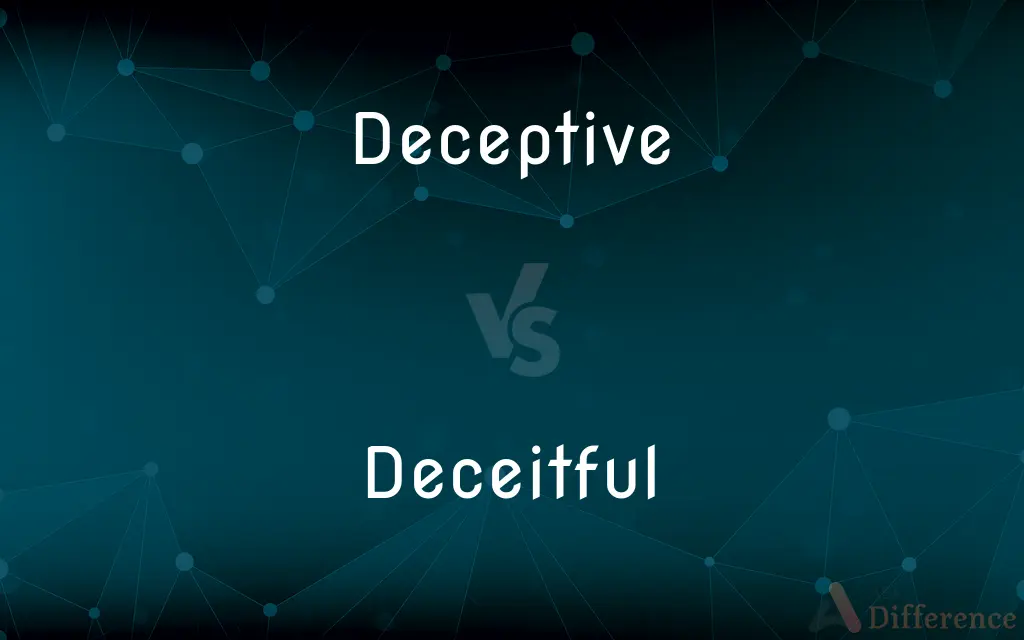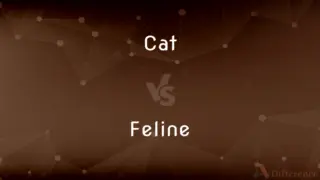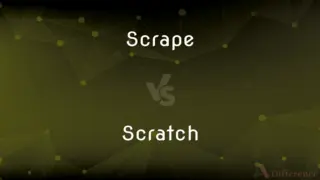Deceptive vs. Deceitful — What's the Difference?
By Tayyaba Rehman & Maham Liaqat — Updated on May 2, 2024
Deceptive involves misleading appearances or impressions, whereas deceitful specifically implies an intent to deceive others through falsehoods.

Difference Between Deceptive and Deceitful
Table of Contents
ADVERTISEMENT
Key Differences
Deceptive refers to something that gives an incorrect impression or misleads through appearances or statements. On the other hand, deceitful is used to describe a person or behavior involving deliberate deception or trickery.
Deceptive might not always involve a conscious intent to mislead; it can simply be due to misleading characteristics. Whereas, deceitful actions are always intentional, aiming to deceive for personal gain or to harm others.
The use of deceptive can apply broadly, including innocent scenarios where confusion is unintentional. In contrast, deceitful implies a moral judgement, suggesting unethical or harmful intentions.
A deceptive situation might result from a misunderstanding or incomplete information. Conversely, deceitful behavior involves calculated lies or manipulations.
Deceptive elements can be found in nature, as with camouflage. On the other hand, deceitful describes human actions and motivations, highlighting a clear intention to manipulate.
ADVERTISEMENT
Comparison Chart
Definition
Giving a misleading impression.
Intentionally misleading others through dishonesty.
Intent
May not be intentional.
Always involves intentional deceit.
Application
Can be used for objects or situations.
Primarily used for describing people or actions.
Moral Judgment
Neutral, depending on context.
Generally negative, implies unethical behavior.
Common Associations
Misleading information, camouflage in nature.
Lies, manipulation, betrayal.
Compare with Definitions
Deceptive
Likely to give a false idea.
The mirror in the room was deceptive, making the space appear larger.
Deceitful
Intended to deceive.
Her deceitful charm was used to manipulate others.
Deceptive
Causing someone to believe what is not true.
Her excuse turned out to be deceptive.
Deceitful
Showing a disposition to lie, cheat, or steal.
A deceitful scheme was concocted to embezzle funds.
Deceptive
Misleading by appearance or statement.
The deceptive packaging made the product look bigger than it was.
Deceitful
Involving deception as a primary tool.
His deceitful appearance concealed his true motives.
Deceptive
Involving deceit indirectly or as a secondary effect.
The advertisement was subtly deceptive about the benefits of the product.
Deceitful
Dishonest and misleading.
He proved to be a deceitful business partner.
Deceptive
Not giving a true or clear idea of the reality.
The shadows in the painting were deceptive, seeming to move.
Deceitful
Full of lies and deceit.
They uncovered the deceitful tactics of the corporation.
Deceptive
Deceiving or tending to deceive
A deceptive advertisement.
Deceitful
Given to cheating or deceiving.
Deceptive
Likely or attempting to deceive.
Deceptive practices
Appearances can be deceptive.
Deceitful
Deliberately misleading; deceptive.
Deceptive
Tending to deceive; having power to mislead, or impress with false opinions; as, a deceptive countenance or appearance.
Language altogether deceptive, and hiding the deeper reality from our eyes.
Deceitful
Deliberately misleading or cheating.
Deceptive
Causing one to believe what is not true or fail to believe what is true;
Deceptive calm
A delusory pleasure
Deceitful
Deceptive, two-faced.
Deceptive
Tending to deceive or mislead either deliberately or inadvertently;
The deceptive calm in the eye of the storm
Deliberately deceptive packaging
A misleading similarity
Statistics can be presented in ways that are misleading
Deceitful
Full of, or characterized by, deceit; serving to mislead or insnare; trickish; fraudulent; cheating; insincere.
Harboring foul deceitful thoughts.
Deceitful
Intended to deceive;
Deceitful advertising
Fallacious testimony
Smooth, shining, and deceitful as thin ice
A fraudulent scheme to escape paying taxes
Deceitful
Marked by deliberate deceptiveness especially by pretending one set of feelings and acting under the influence of another;
She was a deceitful scheming little thing
A double-dealing double agent
A double-faced infernal traitor and schemer
Common Curiosities
What contexts typically use the term deceptive?
Deceptive is often used in contexts where something or someone gives a false impression unintentionally, like advertising or visual illusions.
In legal terms, how are deceptive and deceitful viewed differently?
Legally, deceptive practices may refer to misleading but not outright fraudulent activities, whereas deceitful practices are closely associated with fraud and intentional harm.
What are the consequences of deceptive versus deceitful behavior in relationships?
Deceptive behavior might cause misunderstandings in relationships, while deceitful behavior, being based on lies, can lead to more serious trust issues and potential breakdowns.
Can a person be described as deceptive without being deceitful?
Yes, a person can appear deceptive if their actions unintentionally cause misunderstandings, whereas being deceitful implies deliberate dishonesty.
How do deceptive and deceitful differ in psychological impact?
Deceptive might confuse or mislead someone temporarily, whereas deceitful actions can lead to mistrust and psychological distress due to the betrayal involved.
Is being deceitful always illegal?
Not always; while deceitful behavior is often unethical, it is not necessarily illegal unless it involves fraud, theft, or other criminal activities.
Can historical events be classified as deceptive or deceitful?
Historical events can be interpreted as deceptive if they are misunderstood by the public, and deceitful if they involved deliberate misinformation by those in power.
How do cultures view deceptive versus deceitful behaviors?
Cultural perceptions vary, but generally, both deceptive and deceitful behaviors are viewed negatively, though deceitful actions are often judged more harshly.
How do children learn to differentiate between deceptive and deceitful?
Children learn through social cues and parental guidance that deceptive behavior can be a mistake or innocent, while deceitful behavior is clearly wrong and intentional.
What literary devices use deceptive or deceitful themes?
In literature, irony and plot twists often rely on deceptive constructions, while deceitful characters drive narratives in genres like mystery and thriller.
Are there any professions that are commonly considered deceptive or deceitful?
Professions like marketing or politics can be considered deceptive due to the nature of persuasion involved, and sometimes deceitful if they involve intentional lies.
Can technology be deceitful, or is it only deceptive?
Technology itself can be deceptive if it causes misunderstandings, but it becomes a tool for deceitful purposes when used intentionally to mislead or harm.
Are animals ever deceitful, or just deceptive?
Animals can be deceptive, as seen in mimicry and camouflage, but they are not deceitful since deceit requires intentional manipulation understood in human terms.
How do deception and deceit differ in the animal kingdom compared to human society?
In the animal kingdom, deception is often a survival tactic (like camouflage), devoid of moral implications, whereas in human society, deceit often carries moral and ethical judgments.
What role do deceptive and deceitful play in military strategies?
Deceptive strategies in military contexts include feints and camouflage, whereas deceitful strategies might involve espionage and false intelligence.
Share Your Discovery

Previous Comparison
Cat vs. Feline
Next Comparison
Scrape vs. ScratchAuthor Spotlight
Written by
Tayyaba RehmanTayyaba Rehman is a distinguished writer, currently serving as a primary contributor to askdifference.com. As a researcher in semantics and etymology, Tayyaba's passion for the complexity of languages and their distinctions has found a perfect home on the platform. Tayyaba delves into the intricacies of language, distinguishing between commonly confused words and phrases, thereby providing clarity for readers worldwide.
Co-written by
Maham Liaqat















































